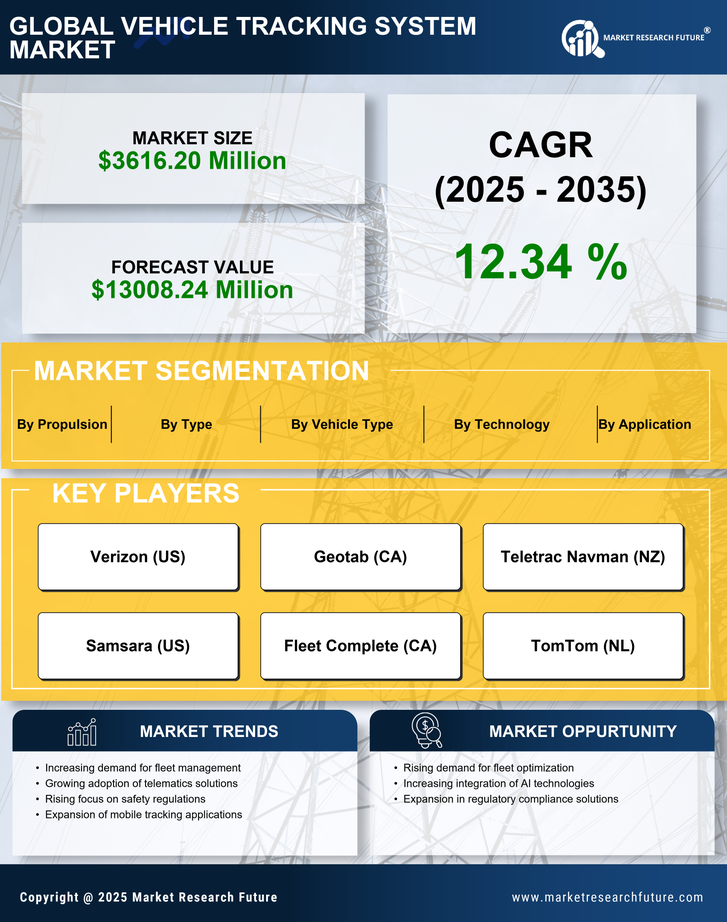Growing Concerns Over Vehicle Security
Concerns regarding vehicle security are increasingly influencing the vehicle tracking-system market. With rising incidents of vehicle theft and unauthorized use, consumers and businesses are prioritizing security measures. The vehicle tracking-system market is responding to this demand by offering advanced tracking solutions that provide real-time alerts and recovery options. In 2025, it is projected that the market for vehicle security systems will grow by approximately 15%, reflecting heightened awareness among vehicle owners. This trend underscores the importance of integrating tracking systems with security features, thereby enhancing the overall value proposition for consumers and businesses alike.
Technological Advancements in GPS and IoT
Technological advancements in GPS and Internet of Things (IoT) are transforming the vehicle tracking-system market. Enhanced GPS accuracy and the proliferation of IoT devices enable more precise tracking and monitoring capabilities. In 2025, it is estimated that over 70% of vehicles in the US will be equipped with some form of tracking technology. This shift is likely to enhance data collection and analytics, allowing businesses to make informed decisions based on real-time information. The vehicle tracking-system market stands to gain from these innovations, as they facilitate improved safety, efficiency, and customer satisfaction. As technology continues to evolve, the potential for new applications and services within the market expands.
Increased Focus on Insurance Cost Reduction
The vehicle tracking-system market is witnessing a growing emphasis on reducing insurance costs through the use of tracking technologies. Insurers are increasingly offering discounts to policyholders who utilize vehicle tracking systems, as these systems provide valuable data on driving behavior and vehicle usage. In 2025, it is anticipated that around 30% of insurance companies in the US will incentivize the adoption of tracking systems. This trend not only benefits consumers through lower premiums but also encourages safer driving practices. The vehicle tracking-system market is thus likely to see increased adoption as more individuals and businesses recognize the financial advantages associated with these technologies.
Rising Demand for Fleet Management Solutions
The vehicle tracking-system market experiences a notable surge in demand for fleet management solutions. Companies are increasingly recognizing the value of real-time tracking to enhance operational efficiency and reduce costs. In 2025, the market for fleet management is projected to reach approximately $20 billion in the US, indicating a robust growth trajectory. This demand is driven by the need for improved route optimization, fuel management, and maintenance scheduling. As businesses strive to maximize productivity, the integration of vehicle tracking systems becomes essential. The vehicle tracking-system market is thus positioned to benefit significantly from this trend, as organizations seek to leverage technology for better decision-making and resource allocation.
Expansion of E-commerce and Delivery Services
The expansion of e-commerce and delivery services is significantly impacting the vehicle tracking-system market. As online shopping continues to grow, businesses are increasingly reliant on efficient logistics and delivery operations. In 2025, the e-commerce sector in the US is projected to surpass $1 trillion, driving demand for effective tracking solutions to ensure timely deliveries. The vehicle tracking-system market is poised to capitalize on this trend, as companies seek to enhance visibility and accountability in their supply chains. By integrating tracking systems, businesses can optimize routes, monitor delivery times, and improve customer satisfaction, thereby reinforcing the importance of vehicle tracking in modern logistics.
















